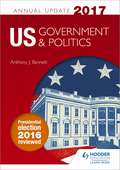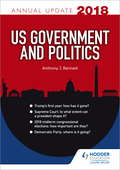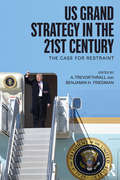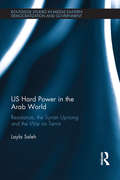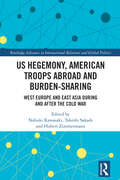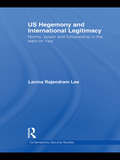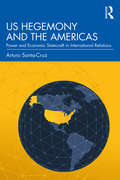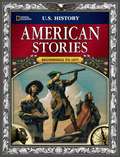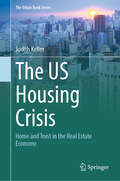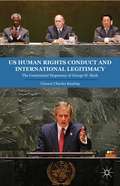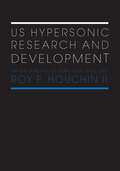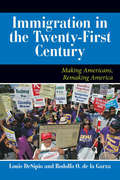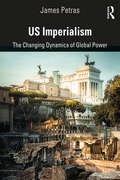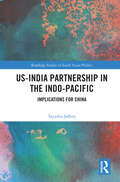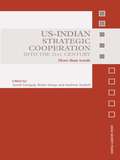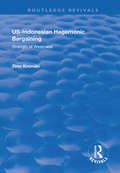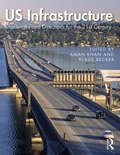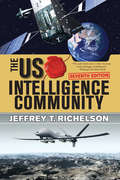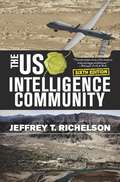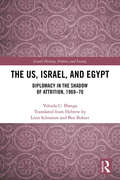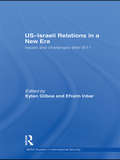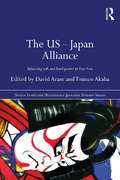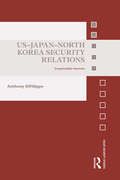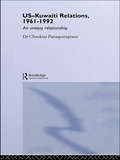- Table View
- List View
US Government & Politics Annual Update 2016
by Anthony J BennettFeaturing information and analysis of recent events in US politics, the Annual Update provides you with topical source material to draw on for tasks throughout your course, and for answering examination questions. Written by an experienced and acknowledged expert in the field of US politics, this is the book you need if you are aiming for the highest grades at A2.- Reviews the key events and developments of 2015 you need to know- Students can analyse up-to-date examples and data to present knowledgeable and persuasive arguments- The perfect update for your textbook, bringing you right up to date with all the topical material you need to succeed in your examsTopics include:1. Which is healthier: the Democrats or the Republicans?2. How important is the Obama cabinet?3. What's happening in the 2016 presidential race?4. Presidential debates: are they substance or theatre?5. What's the Supreme Court been deciding in 2015?6. The Supreme Court: the 2014-15 term7. Women in US Politics: how much have things changed?8. Who's Who in US politics 2016
US Government & Politics Annual Update 2018
by Anthony J BennettTopical reading essential for exam success.- Review all the key developments in US politics from the last year, with expert analysis you can draw on both throughout your course and in the exams- Go beyond your textbooks to build a bank of up-to-date examples and data, helping you develop knowledgeable and persuasive arguments- Know how to hit the highest grades with guidance from experienced teacher and author, Anthony J. BennettContentsChapter 1: The Trump cabinetChapter 2: To what extent can a President reshape the Supreme Court?Chapter 3: The Supreme Court: the 2016/2017 termChapter 4: The Gorsuch nomination to the Supreme CourtChapter 5: More from the 2016 electionsChapter 6: The 2018 midterm congressional electionsChapter 7: Where's the Democratic Party going?Chapter 8: Presidential pardonsChapter 9: An assessment of Trump's first year
US Grand Strategy in the 21st Century: The Case For Restraint (Routledge Global Security Studies)
by A. Trevor Thrall Benjamin H. FriedmanThis book challenges the dominant strategic culture and makes the case for restraint in US grand strategy in the 21st century. Grand strategy, meaning a state’s theory about how it can achieve national security for itself, is elusive. That is particularly true in the United States, where the division of federal power and the lack of direct security threats limit consensus about how to manage danger. This book seeks to spur more vigorous debate on US grand strategy. To do so, the first half of the volume assembles the most recent academic critiques of primacy, the dominant strategic perspective in the United States today. The contributors challenge the notion that US national security requires a massive military, huge defense spending, and frequent military intervention around the world. The second half of the volume makes the positive case for a more restrained foreign policy by excavating the historical roots of restraint in the United States and illustrating how restraint might work in practice in the Middle East and elsewhere. The volume concludes with assessments of the political viability of foreign policy restraint in the United States today. This book will be of much interest to students of US foreign policy, grand strategy, national security, and International Relations in general.
US Hard Power in the Arab World: Resistance, the Syrian Uprising and the War on Terror (Routledge Studies in Middle Eastern Democratization and Government)
by Layla SalehNeither stability nor change in the post-colonial Arab world can be fully understood without considering the international context, and American Foreign policy in particular. However, the exact nature of America’s presence in the Arab world, and the scope and modes of its influence, all appear to have reached a crossroads since the Arab uprisings. ‘US Hard Power in the Arab World’ traces the US’s "power of persuasion" in the Arab Middle East from the onset of the War on Terror in 2001 through to the Arab Spring. With a particular focus on Syria, the book explores the limits of an American "smart power" amid the emergence of a growing indigenous "soft power" whose ire is directed not only at Assad’s regime, but also at the violence perpetrated or enabled by the international community, headed by the US. It is argued that the blurring of the two forms of "soft" and "hard" American power has tarnished the credibility of US policies geared to win hearts and minds in the Arab world. ‘US Hard Power in the Arab World’ narrates the contests between attraction and intimidation, public diplomacy and military occupation, elites and publics, seduction and resistance. Drawing upon a multitude of primary sources, including personal interviews with Syrian activists and opposition figures, this book will be a valuable resource for students and scholars of Middle East Politics, as well as those concerned with American Foreign Policy and the Arab Spring.
US Hegemony, American Troops Abroad and Burden-Sharing: West Europe and East Asia during and after the Cold War (Routledge Advances in International Relations and Global Politics)
by Nobuki Kawasaki Takeshi Sakade Hubert ZimmermannKawasaki, Sakade, Zimmerman, and their contributors examine the historical development of burden-sharing among the United States (US) and its allies after World War II, looking at examples from Western Europe and East Asia.Through a series of case studies, the contributors to this volume identify the characteristics and historical transformations in the burden-sharing relationships between the US and its allies. In addition to diplomatic and security concerns, they also look at the economic and financial dimensions of burden-sharing and how all these elements are intertwined. They also address the different dynamics of burden-sharing between the US and Western Europe – notably Germany and the United Kingdom (UK) – on the one hand and between the US and East Asia – particularly Japan and Korea – on the other. In particular, they argue that while Western European countries provided most of the economic and political support for American policies until the 1960s, the economic support from East Asian countries became much more important from the 1970s onwards.This book is a valuable contribution to the literature on burden-sharing and strategic alliance for scholars of international relations and the diplomatic history of the Cold War.
US Hegemony and International Legitimacy: Norms, Power and Followership in the Wars on Iraq (Contemporary Security Studies)
by Lavina Rajendram LeeThis book examines US hegemony and international legitimacy in the post-Cold War era, focusing on its leadership in the two wars on Iraq. The preference for unilateral action in foreign policy under the Bush Administration, culminating in the use of force against Iraq in 2003, has unquestionably created a crisis in the legitimacy of US global leadership. Of central concern is the ability of the United States to act without regard for the values and interests of its allies or for international law on the use of force, raising the question: does international legitimacy truly matter in an international system dominated by a lone superpower? US Hegemony and International Legitimacy explores the relationship between international legitimacy and hegemonic power through an in depth examination of two case studies – the Gulf Crisis of 1990-91 and the Iraq Crisis of 2002-03 – and examines the extent to which normative beliefs about legitimate behaviour influenced the decisions of states to follow or reject US leadership. The findings of the book demonstrate that subordinate states play a crucial role in consenting to US leadership and endorsing it as legitimate and have a significant impact on the ability of a hegemonic state to maintain order with least cost. Understanding of the importance of legitimacy will be vital to any attempt to rehabilitate the global leadership credentials of the United States under the Obama Administration. This book will be of much interest to students of US foreign policy, IR theory and security studies. Lavina Rajendram Lee is a lecturer in the Department of Modern History, Politics and International Relations at Macquarie University, Australia, and has a PhD in International Relations from the University of Sydney.
US Hegemony and the Americas: Power and Economic Statecraft in International Relations
by Arturo Santa-CruzIn this book, Arturo Santa-Cruz advances an understanding of power as a social relationship and applies it consistently to the economic realm in United States relations with other countries of the Western Hemisphere. Following the academic and popular debate on the ebb and flow of US hegemony, this work centers the analysis in a critical case for the exercise of US power through its economic statecraft: the Americas—its historical zone of influence. The rationale for the regional focus is methodological: if it can be shown that Washington's sway has decreased in the area since the early 1970s, when the discussion about this matter started, it can be safely assumed that the same has occurred in other latitudes. The analysis focuses on three regions: North America, Central America and South America. Since each region contains countries that have at times maintained very different relationships with the United States, the findings contribute to a better understanding of the practice of US power in the sub-region in question, adding greater variability to the overall results. US Hegemony and the Americas: Power and Economic Statecraft in International Relations is an invaluable resource for students and scholars interested in Latin American History and Politics, North American Regional Integration, International Relations, Economic Statecraft, Political Economy and Comparative Politics.
US History: American Stories, Beginnings to 1877
by National Geographic StaffThe history of the United States is a chronicle of different regions that today are pulled together on a cultural basis. In the early years, our identity as a nation was defined on a military or political basis-- and we're still struggling with those differences.
The US Housing Crisis: Home and Trust in the Real Estate Economy (The Urban Book Series)
by Judith KellerThis book aims to draw careful distinctions between the various forms of housing insecurity and personal circumstances research participants experience. While the urgency of the housing crisis in the US has produced a lot of scholarly work on housing, it often fails to recount the real life struggles that the housing crisis is causing. This is where the book provides a distinct contribution to housing studies and urban geography. The author use of trust as an analytical lens, her qualitative approach, and her work with people on the ground aim to move away from a quantitative understanding of the crisis by giving it a human face. The author seeks to bring to light the human costs of the destruction of home as well as the political reactions and day-to-day strategies that residents apply to make ends meet in times of the US housing crisis.
US Human Rights Conduct and International Legitimacy
by Vincent Charles KeatingWas the Bush administration was successful in legitimating its preferences with habeas corpus, torture, and extraordinary rendition? As American transforms in the post-Bush era, scholars have begun to assess the post-9/11 period in American foreign and domestic policy, asking difficult questions regarding torture and human rights.
US Hypersonic Research and Development: The Rise and Fall of 'Dyna-Soar', 1944-1963 (Space Power and Politics)
by Roy F. Houchin IIAn essential new account of some of the most valuable research and development in international military history. Roy F. Houchin II shows how the roots of US Air Force hypersonic research and development are grounded in Army Air Force General Henry H. 'Hap' Arnold's identification of the need for advanced airpower weapon systems to meet the anticipated postwar enemy threat. The technology for a smooth transition to military spaceflight seemed within reach when Bell Aircraft Corporation executive Walter Dornberger (the former commander of Nazi Germany's V-2 rocket research) made an unsolicited proposal to William E. Lamar (the chief of Wright Aeronautical Development Center's New Development Office of the Bomber Aircraft Division at Wright-Patterson AFB, OH) for a hypersonic boost-glide weapon system. Visionaries like Arnold, Dornberger, and Lamar believed a hypersonic boost-glider would represent the ultimate expression of the US Air Force's doctrine by performing strategic bombardment and reconnaissance more successfully any other type of vehicle. As this aspiration reached maturity in Dyna-Soar, the service's leadership never gave up their beliefs. This book shows how the struggle to persuade the secretary of defence and his advisors, who did not share the Air Force's vision for a military spaceplane, illustrates the ebb and flow of an advanced technology program and its powerful legacy within American society.
US Immigration in the Twenty-First Century
by Louis Desipio Rodolfo O. de la GarzaImmigration in the Twenty-First Century is a comprehensive examination of the enduring issues surrounding immigration and immigrants in the United States, beginning with a look at the history of immigration policy, followed by an examination of the legislative and legal debates waged over immigration and settlement policies today and concluding with a consideration of the continuing challenges of achieving immigration reform in the United States. The authors also discuss the issues facing immigrants in the United States, from the reception of immigrants within the native population to the relationship between minorities and immigrants. Immigration and immigration policy continues to be a hot topic on the campaign trail, and in all branches of federal and state government. U. S. Immigrants and Immigration Policies in the Twenty-First Century provides students with the tools and context they need to understand these complex issues.
US Imperialism: The Changing Dynamics of Global Power (Studies In Critical Social Sciences / Critical Global Studies #83/6)
by James PetrasThis book offers a broad and deep examination of the dynamics of US imperialism. Petras analyzes imperialism not only as economic domination, showing that its impact in the world takes many forms, including cultural, political and historical. He points to the disruptive effects it has on other world regional economies and cultures. Capitalism and imperialism take diverse forms but both are intimately tied to the projection of state power in the service of capital—a strategy designed to advance the geopolitical and economic interests of the US economic elite and ruling class—interests that are equated with the 'US national interest'.
US-India Partnership in the Indo-Pacific: Implications for China (Routledge Studies in South Asian Politics)
by null Tayyaba JafferyThis book discusses the partnership between the US and India in the Indo-Pacific region, which also serves as an engine for the Quad alliance of the US, India, Japan, and Australia. It investigates the multilateral efforts taken by the Quad and its effects on changing, reforming, or establishing a new regional security complex against China in the Indo-Pacific.The theory employed by the author is based on a novel construct of Heterarchical Regional Security Complex (HRSC), which refers to a de-centralized principle of power distribution; that is, power is not concentrated in a particular element but rather diffused within the entire structure. When merged with the Regional Security Complex (RSC) Theory, it presumes the creation of such a security complex in which all members have roughly equal power. This book unravels how the Quad can operate as an HRSC in balancing against China’s growing hold in the region. It is supplemented by the Balance of Threat framework to discuss the functioning of Quad from a minilateral perspective with a heterarchical overlay. Besides Quad, this book also focuses on the blooming partnership between the US and India since the turn of the century (2007–2020).This book will be beneficial for researchers interested in international relations, Asian politics, regional security, and Indo-Pacific studies.
US-Indian Strategic Cooperation into the 21st Century: More than Words (Asian Security Studies)
by Sumit Ganguly Brian Shoup Andrew ScobellIn this edited book, leading scholars and analysts trace the origins, evolution and the current state of Indo-US strategic cooperation. During the Cold War, owing to opposing grand strategies, the two states frequently found themselves at odds. With the end of the Cold War and the demise of the Soviet Union, Indo-US security cooperation started in a fitful fashion, but in recent years it has acquired considerable stability. The armed forces of the two states have participated in exercises on land, sea and air and have also carried out joint humanitarian missions. Drawing on new information and with contributions from both academics and policy makers, this wide-ranging volume analyzes the strategic convergence of the world’s two largest democracies, whilst explaining why important differences do remain. These notably include questions pertaining to the future of India’s nuclear and ballistic missile programs, US-Pakistan ties and India’s links with Iran. This volume will be of great interest to students of South Asian politics, Asian security, US foreign policy and security studies in general.
US-Indonesian Hegemonic Bargaining: Strength of Weakness
by Timo KivimäkiTitle first published in 2003. Following the terrorist attacks of September 11, 2001 and October 12, 2002 in the United States and on Bali, we may be witnessing the most sweeping shift in US foreign policy since the beginning of the cold war. America is again committed to leading the world in a battle against a global enemy. The US relationship with Indonesia - the country with the world’s largest Islamic population - could prove to be of decisive importance for the success of its new global mission. Timo Kivimäki’s analysis of the dynamics and background of the US-Indonesian relationship will be essential reading for all concerned with American Foreign Policy, Asian studies, peace studies and conflict resolution and negotiation.
US Infrastructure: Challenges and Directions for the 21st Century
by Aman Khan Klaus G. BeckerThis book presents an in-depth look at US infrastructure and its challenges in the 21st century. While infrastructure has received considerable attention in recent years, much of the discussion has concentrated on physical, economic, or noneconomic conditions. The Trump administration has heightened interest in the topic, promising infrastructure spending during his tenure, yet little demonstrable progress has been made. This book brings together a multi-disciplinary perspective—structural, technological, economic, financial, political, planning, and policy—that has been largely absent in discussions on the subject, to provide a clearer and broader understanding of the challenges facing US infrastructure. The book is divided into three parts: Part I looks at the challenges from a structural, technological, and sustainability perspective; Part II from an economic, productivity, and finance perspective; and Part III from an institutional, security, and political perspective. Written primarily for policy makers, managers, and administrators in public and private organizations, as well as individuals and academics with an interest in the future of US infrastructure, this book provides an in-depth analysis of the US infrastructure problem, its causes and consequences, and suggests timely, specific measures that may be taken at the state, local, and federal levels to improve and better secure our roads, transit, public buildings, economy, and technology.
The US Intelligence Community
by Jeffrey T. RichelsonThe sixth edition of this comprehensive overview of the United States intelligence apparatus is updated to reflect changes in organizational structures and processes as well as to take advantage of the latest publicly available sources on intelligence organizations, management and methods. Beginning with an introduction on basic intelligence principles, the volume covers national intelligence organizations, Defense Department intelligence and the DIA, service branch intelligence organizations, civilian organizations, imagery, image processing and signals intelligence, space surveillance, human intelligence assets, cooperation with foreign services, analysis, counterintelligence, covert action, national intelligence community management, Defense Intelligence management and managing intelligence collections, covert action and information access. The work includes black and white photographs, sample documents and organizations charts as well as an essential glossary of acronyms. Richelson is a senior fellow at the National Security Archive in Washington D. C. Annotation ©2011 Book News, Inc. , Portland, OR (booknews. com)
The US Intelligence Community
by Jeffrey T. RichelsonThe role of intelligence in US government operations has changed dramatically and is now more critical than ever to domestic security and foreign policy. This authoritative and highly researched book provides a detailed overview of America’s vast intelligence empire--its organizations, its operations (from spies on the ground to satellites thousands of miles in space), and its management structure. Relying on a multitude of sources, including hundreds of official documents, author Jeffrey T. Richelson provides an up-to-date picture that will allow students to understand the full scope of the US intelligence community’s organizations and activities and give valuable support to policymakers and military operations. Fully revised throughout, the sixth edition of this definitive text includes new material on intelligence organization, foreign and domestic intelligence collection and analysis, covert action, and cooperation with foreign intelligence services.
The US Intelligence Community
by Jeffrey T RichelsonThe role of intelligence in U.S. government operations has changed dramatically and is now more critical than ever to domestic security and foreign policy. This authoritative and highly researched book provides a detailed overview of America's vast intelligence empire--its organizations, its operations (from spies on the ground to satellites thousands of miles in space), and its management structure.Relying on a multitude of sources, including hundreds of official documents, author Jeffrey T. Richelson provides an up-to-date picture of the U.S. intelligence community that will allow students to understand the full scope of organizations and activities and give valuable support to policymakers and military operations. Fully revised throughout, the sixth edition of this definitive book includes new material on intelligence organization, foreign and domestic intelligence collection and analysis, covert action, and cooperation with foreign intelligence services.
The US, Israel, and Egypt: Diplomacy in the Shadow of Attrition, 1969-70 (Israeli History, Politics and Society)
by Yehuda U. BlangaThis book deals with the diplomatic triangle of Israel, the United States, and Egypt during the War of Attrition along the Suez Canal in 1969–1970. Considering the Egyptian president’s political positions and outlooks on the Arab-Israeli conflict and the pan-Arab sphere, relations with the United States, the study reviews the internal disagreements between the State Department and Henry Kissinger, the national security adviser in the White House. The study demonstrates that the United States and Egypt worked together to thaw their relations after the severance of ties in June 1967, motivated by a desire to protect and advance their interests in the Middle East. The book is based chiefly on textual analysis of political and historical events in the domain of international relations, but with the same attention to internal policy as well. In addition, the research draws chiefly on primary sources that have only recently been released to the general public and that have not yet been the subject of serious analysis. The lion’s share of the work is based on qualitative content analysis of documents from the National Archives in Washington and especially of the US State Department. Providing a reading that is new, comprehensive, and complete, both with regard to the scope of the sources as well as the analysis of developments in the relations between Egypt and the United States, this book is a key resource for students and scholars interested in the Arab-Israeli conflict, political science and diplomacy, Israeli studies and the Middle East.
US-Israeli Relations in a New Era: Issues and Challenges after 9/11
by Eytan Gilboa Efraim InbarThis book examines in depth the fundamental problems, factors and issues in current US-Israeli relations, which will have implications both for the Middle East and for world peace and prosperity. The US and Israel have established an exceptional relationship, which has significant effects on events and processes in the entire Middle East. Israel depends on the US for military hardware, for support against hostile international organizations, and for economic and financial aid. In turn, it is viewed by the US as a strong and reliable ally, and the US has adopted strategic concepts that for decades have governed Israel's national security, such as pre-emptive strikes and counter-terrorist strategies. However, politicians and scholars have accused Israel and pro-Israeli organizations of exerting too much influence on US policy in the Middle East. Here, a collection of international experts present original research and findings on a wide variety of critical bilateral and regional issues in American-Israeli relations, approaching the topics from both theoretical and practical angles.
The US-Japan Alliance: Balancing Soft and Hard Power in East Asia (Nissan Institute/Routledge Japanese Studies)
by Tsuneo Akaha David AraseJapan's use of Soft power in its international politics is as yet understudied. Soft power presents as many challenges as promises. This book explores the way Japan uses soft power in its relationship with the US, its Asian neighbours and Europe and aims to contribute to a deeper understanding of the role of soft power in international relations. Hard power, on the other hand, is more tangible and has received far greater scholarly scrutiny than soft power. However, as this collection makes clear, hard power has its limitations and counterproductive consequences as an instrument of policy. This book makes it clear that hard power alone will not provide Japan with the peace and security it desires. A smart balancing or mixture of hard and soft power is required. Is Japan up to this challenge? While this book cannot give a definitive answer to this question, the excellent line-up of contributors present their best analyses of the effectiveness of Japan's current attempt at balancing the two components of national power in meeting its bilateral and multilateral security challenges. The US-Japan Alliance is suitable for upper undergraduates, postgraduates and academics in International Politics, Political Science, Security studies and Japanese studies. Winner of The Masayoshi Ohira Memorial Special Prize, 2011.
US-Japan-North Korea Security Relations: Irrepressible Interests (Asian Security Studies)
by Anthony DiFilippoThis book examines the major security and related issues between the United States, Japan and North Korea (officially, the Democratic People’s Republic of Korea - DPRK). Although focusing mainly on current issues, this book also provides sufficient historical background to enable readers to appreciate the many nuances that have been ignored by policymakers, analysts and the media. Where appropriate, the book examines the security interests of other nations in Northeast Asia, specifically South Korea, China and Russia. The central purpose of the book is to objectively analyze the policymaking processes of Washington, Tokyo and Pyongyang with respect to the DPRK's nuclear weapons and other important security issues, and ultimately to provide practical ways to improve the security environment in Northeast Asia. Ongoing security-related issues include nuclear missile testing by the DPRK; its removal from the U.S. list of states sponsoring terrorism, and the abduction of Japanese nationals by North Korean agents that occurred during the 1970s and 1980s. Unlike other books, which typically take the position that North Korea is a rogue state run by an irrational, belligerent and autocratic leader, this book reveals the fundamentals of Pyongyang’s security concerns in the region. This book will be of great interest to students of North East Asian politics, Asian security studies, US foreign policy and Security Studies/IR in general.
US-Kuwaiti Relations, 1961-1992: An Uneasy Relationship
by Chookiat PanaspornprasitAfter being granted full independence in 1961, Kuwait began its tumultuous relationship with the US. This book sets out to investigate this alliance within the frameworks of a ‘small state’ and ‘influence’, and in particular under the US presidents Carter, Reagan, and Bush. The political, diplomatic and military aspects are examined which have both stalled and enhanced the bilateral relationship at different times and events. The relationship between the two countries has not always been a straightforward one. Kuwait, overshadowed by its bigger neighbour Saudi Arabia, was regarded as a derivative interest by the US and its role within the region more often than not underestimated. Shedding new light on this key political alliance, the book details how this uneasy relationship evolved while Kuwait maintained its independent foreign policy, which contradicted US national interest. Illuminating and informative, it is essential reading for anyone with an interest in Middle East politics and international relations.
